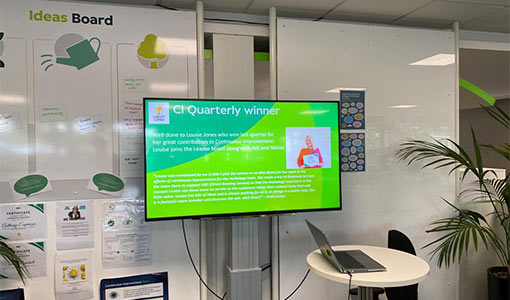7th August 2023

In need of fresh inspiration for your contact centre? Look at all the great things that have been happening at the Specsavers contact centre in Nottingham, including:
Megan Jones, Editor at Call Centre Helper, shares the top tips and advice she learnt by visiting Specsavers HQ.
The Specsavers teams handle over 550,000 inbound calls, more than 30,000 outbound calls, 180,000+ emails, and 90,000+ live chats every year, all whilst supporting and inspiring their frontline teams to deliver fantastic service.
Here are 16 ideas to try from the Specsavers Contact Centre in Nottingham:
As the idiom goes, “don’t rest on your laurels”. The Specsavers team are constantly benchmarking themselves against other businesses and taking proactive steps to ensure they remain an employer of choice in the local area – particularly as Nottingham is a call centre hub with fierce competition for the best staff!
The contact centre is a hub of customer insight. By actively sharing this data to help support other departments, you can create stronger partnerships across the business, support the creation of training material for new starters, and more. This approach can also help improve the value of the contact centre.
For more ideas on sharing the contact centre with the wider business, read our article: 12 Inspiring Tactics for Sharing the Call Centre With the Wider Company
Not everyone likes or finds it easy to absorb information by reading an email or leaflet.
That’s why recording internal podcasts can help employees absorb knowledge in different formats.

Dedicate time to making process maps for everything you do.
After all, if you don’t know what’s actually happening across all of your business processes, how can you make improvements?
Specsavers have a dedicated training room for new starters. The desk set-ups are the same as on the call centre floor – with sugary treats on hand to help them through the intense training period.
They also only train six new starters at any one point, so they get the support they need to hit the ground running.
Give everyone one hour every month that they can use how they like for their development. This gives a sense of ownership of learning and makes sure everyone feels invested in.
Specsavers also have a process in place for this time to be banked when someone is on annual leave and given to someone else, so it doesn’t just get lost.
Make sure agents don’t overuse a customer’s name throughout a call, as it can get very annoying.
Just use it at the start and end to personalize the call – without overdoing it.
Specsavers have invested in a programme of continuous improvement and created a dedicated team to manage this, which has paid dividends! So far, the team have seen over 150 time-saving ideas come in from the frontline, and around 50 of them have been implemented.
These very tangible efficiency savings have allowed for people to be redeployed and more evenly spaced across the business, supporting performance.
Want to introduce a continuous improvement programme? Here are some top tips to help:
A great way to help your teams get familiar with new product lines – such as a new range of glasses – is to launch them on the contact centre floor, so they get the opportunity to try on and see new ranges of glasses and live and breathe the brand.
Don’t just hire for contact centre experience and skills, hire for behaviours!
This approach can widen the talent pool and help managers to find hidden gems who might have otherwise been missed.

There’s always room for improvement in self-service options, so make sure you’re continuously monitoring incoming queries to determine what should be added to the app for self-service.
This little and often approach can have a positive long-term impact on reducing calls into the contact centre, as well as improving your customer experience (CX).
The Specsavers team place a variety of birthday cards in easy reach on the contact centre floor, so if an agent picks up in conversation that it’s a customer’s 80th birthday, they can quickly and easily send out a card to give a personal touch.
Investing in your management information (MI) team can make the world of difference in basing business decisions on fact – not feeling.
This is particularly helpful when it comes to emotive topics, such as altering shift patterns and needing more people to work later into the evening, where it’s even more important to be getting it right before disrupting the team.
At Specsavers HQ, all trainers are based in-house and take a proactive approach to upskilling the frontline teams.
This contributes to a flexible, long-term ability of being able to move people around – even at short notice – to help support customer demand if and when issues arise.

Rather than having ‘duty manager’ as a rolling responsibility across several managers, the Specsavers team made the decision to bring the work into a single, dedicated role.
This has made it easier to spot trends, such as recurring IT issues that need addressing, as well as absence issues that might need escalating.
The designated duty manager now also deals with absence calls and other day-to-day distractions, which has helped to streamline the team managers’ role so they can focus all their attention on supporting their people and serving customers.
Encourage your people to get out and support the community with educational visits. This could include visiting schools and local scouting groups, if and when the opportunity arises.
Also give them the flexibility to do this. For example, the Specsavers leadership team recently supported a request for a colleague to visit their daughter’s school – with a hearing aid Barbie and giving the children certificates at the end.
It’s a win-win for the individual – who gets to develop new skills and explore a passion project – and the community they’re supporting – who benefit from new experiences and outside perspectives.
For more best practices and other fun tips from other contact centres that we have visited, read our articles: